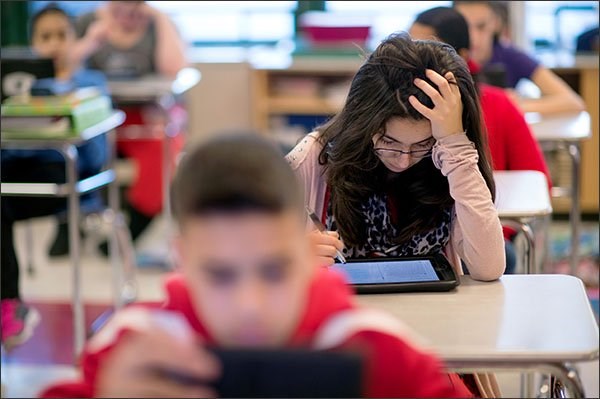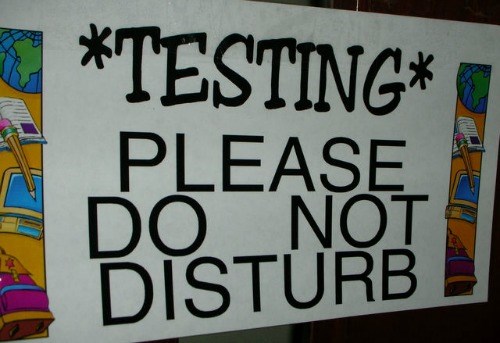
On March 23, more than 100 parents from across the five boroughs rallied at City Hall in Manhattan as part of a statewide "Say Yes To The Test" effort to encourage parents to get behind state the Common Core standardized testing. The rally was a precursor to the start of the standardized testing season, which kicked off in New York city on March 27.
If you're a parent of a school-aged child in New York City, you likely are very familiar with the controversy around the Common Core State Standards, a rigorous set of math and reading benchmarks adopted in a majority of the states and designed to bring kids around the country up to the same eduction level.
[perfectpullquote align="right" cite="" link="" color="" class="" size=""]"I've heard it said that if you can track a problem, you can treat a problem. Well these assessments help my child's teachers do just that."[/perfectpullquote]
No state has embraced the Common Core Standards as quickly and as boldly as New York. In 2011, a year after the standards were released, the state education department started the long process of pulling together the materials needed to implement the Common Core-aligned curriculum. New York schools were told to start implementing the new standards during the 2011-12 school year, and students started taking Common Core tests in the spring of 2013 — a full two years before students in most states.
Immediately, under the extreme rigor of the new tests, the percentage of students passing the state's reading and math tests dropped by more than 20 points. Still, Gov. Andrew Cuomo held onto the belief that pushing an educational standard might take some time, but would have positive long-term effects and despite the outcry of the state's teachers unions, got the legislature to pass a teacher evaluation system that based 20 percent of teachers' ratings on their students' test score growth.
Critics of the test, however-- and there are many-- say the testing requirements are a government overreach. Others say the test is biased and does not take into account the educational environment, resources and support system (or lack thereof) of each child. And still others say that by forcing teachers to "teach to the test," it discouraged classroom creativity while forcing students to focus on rote learning and not enough on comprehension.
Still, there are coalitions of educational organizations and unrelenting force of parents-- like those who attended the rally-- who support the tests. They say the see a marked improvement in their child's overall math and literacy comprehension, and they feel the new standards are only preparing their child to compete academically in the real world.
"I've heard it said that if you can track a problem, you can treat a problem. Well these assessments help my child's teachers do just that. It's like an annual check-up letting them know which lessons my son has learned and which they haven't," said Jean Holybrice, a Fort Greene parent. "With this information, parents like me can have a better understanding what's happening in their child's classroom. I'm saying yes to the test for my son and urging all parents to do the same."

Students First New York, a non-profit organization advocating for full student participation in standardized testing, argues that there have been reforms made since the Common Core standards were first administered and that it is important to communicate with both students and parents about how the tests can be altered to better fit their learning needs.
"There have been some changes that were made," said Michael Nitzky of Students First New York. "Some criticism has been that the tests are too stringent. Some of the content has been changed at the timing was removed."
High Achievement New York is another coalition in favor of standardized testing and the Common Core standards. On its website it says that the Common Core can "help put every child on a path to success." Members of this coalition were also present at the rally.
FairTest, the national center for fair and open testing, believes school time should be used for teaching and learning, rather than testing and test prep. The organization remain a critic of Common Core standards. The FairTest website gives parents the resources and information needed to opt out of standardized tests. According to its website, more than 650,000 students nationwide opted out in the 2014-15 school year.
FairTest points out that, aside from unfairly or inaccurately reflecting the abilities of students of color, the standardized test does not represent the aptitude of English language learners, children with disabilities nor low-income youth.
"We believe that New York state should lead a system of performance assessment," said Robert Schaeffer of FairTest. He pointed to the New York performance standards consortium, a group of high schools in New York City that were granted permission to ignore all tests except for English language arts (The high schools that are included in this consortium can be found here). "Rather than tests, student work, presentations, projects, etc. are looked at here. These schools have a higher college attendance rate, and a higher retention rate."
Patricia Farrell is both a New York City public school teacher and a parent who lives in Fort Greene. She feels the current standardized testing protocol fails to build meaningful comprehension in subject matters for students, in lieu of test scores: "I believe that school systems create generalities in our society, as in, people who know a little bit about a lot of things. I think it's better to be very well versed at something that will feed your desire about what you want to do in the future."
Nearly five years after the standardized testing was first introduced into the New York City school system, opinions remain split about whether or not to say "yes to the test."
Whether you have a child or not, where to you stand on the issue of standardized testing?



